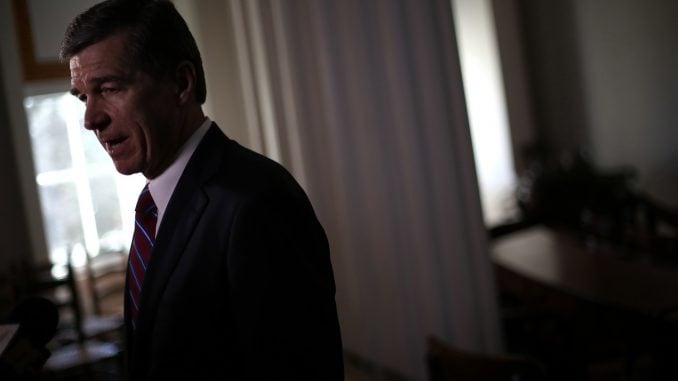
RALEIGH Gov. Roy Cooper announced his administration’s first two-year budget proposal Wednesday, presenting suggested spending priorities to the N.C. General Assembly as lawmakers commence biennial budget negotiations.”This is a fiscally sound budget,” said Cooper at a press conference. “All of these investments … contribute to a robust economy.”Totaling nearly $23.5 billion in the first year, and eclipsing $24 billion in the second, Cooper’s budget emphasizes teacher and state employee pay raises, expands Medicaid to cover more than 600,000 additional state residents, and allocates $100 million for additional disaster relief related to Hurricane Matthew and Western North Carolina wildfires.”Gov. Cooper’s plan makes sound investments in our schools, our students and our work force, and creates opportunities to bring quality jobs to North Carolina again,” said Senate Minority Whip Terry Van Duyn (D-Buncombe). “We believe in our people; I’m hoping Republicans will give the governor’s plan serious consideration and join us in investing in our state again.”The welcome was not quite as warm from those in the legislature’s Republican majority, as N.C. Senate leader Phil Berger (R-Rockingham) slammed the budget proposal for its sizable spending increases.”If the news reports are true, Gov. Cooper is clearly growing nostalgic for the Easley-Perdue days of runaway spending and his reckless $1 billion spending spree would surely return us to the days of high taxes and multi-billion dollar deficits,” said Berger in a press release Wednesday. “We believe a more prudent approach is investing generously in public education and other priorities while still saving for a rainy day and returning hard-earned tax dollars to our taxpayers.”Under the proposal, all state employees would receive a pay increase of either 2 percent or $800, whichever is greater, at a cost of more than $350 million over the two-year period, augmented further by a one-time $500 bonus.A plan to raise teacher pay to the highest in the Southeast within three years spends approximately $800 million over two years, while also also proposing a 6.5 percent salary increase for school administrators.”We just have to make education a priority,” said Cooper.In total, the governor’s recommended “investments in human capital” approaches $2 billion in spending over the budget cycle, including a one-time 1.5 percent cost-of-living-adjustment for state retirees, and targeted raises for the state highway patrol.In the health care space, Cooper recommends expanding Medicaid to cover 624,000 additional individuals who currently make too much money to qualify for the entitlement program. The expansion is described as “cost-neutral” to the state, projecting $4 billion in annual federal injections while relying on hospitals to pay for additional state obligations resulting from expansion.”I think [hospitals] are willing, ready and able to step up for this expansion,” said Cooper of his proposal to grow the entitlement program.Cooper previously tried to expand the program without the sanction of the legislature via an amendment to the state’s Medicaid plan, but was blocked by the courts as a result of legal action taken by the General Assembly, which asserted Cooper did not have the authority to change eligibility thresholds unilaterally.The governor’s budget also includes a $10 million reintroduction of film tax credit incentives that Republican lawmakers recently eliminated.Including the appropriation of federal funds, health care makes up the largest portion of the recommended budget both years, representing more than 35 percent of the total outlays, while education comes in at a close second with just under 35 percent over the cycle.The governor’s recommended budget is just that a recommendation. The General Assembly holds the purse strings and can choose to run with key executive spending priorities if they choose, but under Republican control the legislature is unlikely to offer support for much of the fiscal suggestions from Cooper. However, in those areas of basic alignment, such as teacher pay and adding to savings reserves, both branches could move closer to the goals presented to voters during the most recent campaigns.The next steps will involve the legislature forming their own working budget as they balance myriad fiscal obligations with an expressed interest in continuing tax and regulatory reforms.



